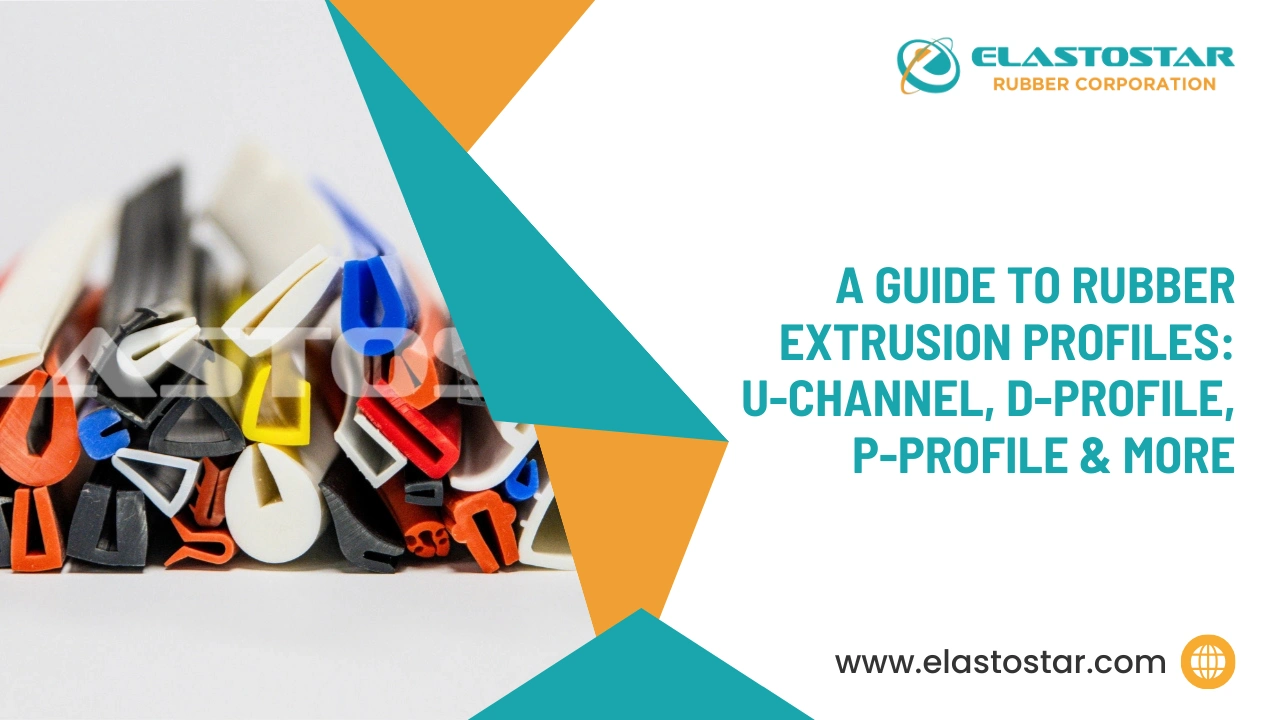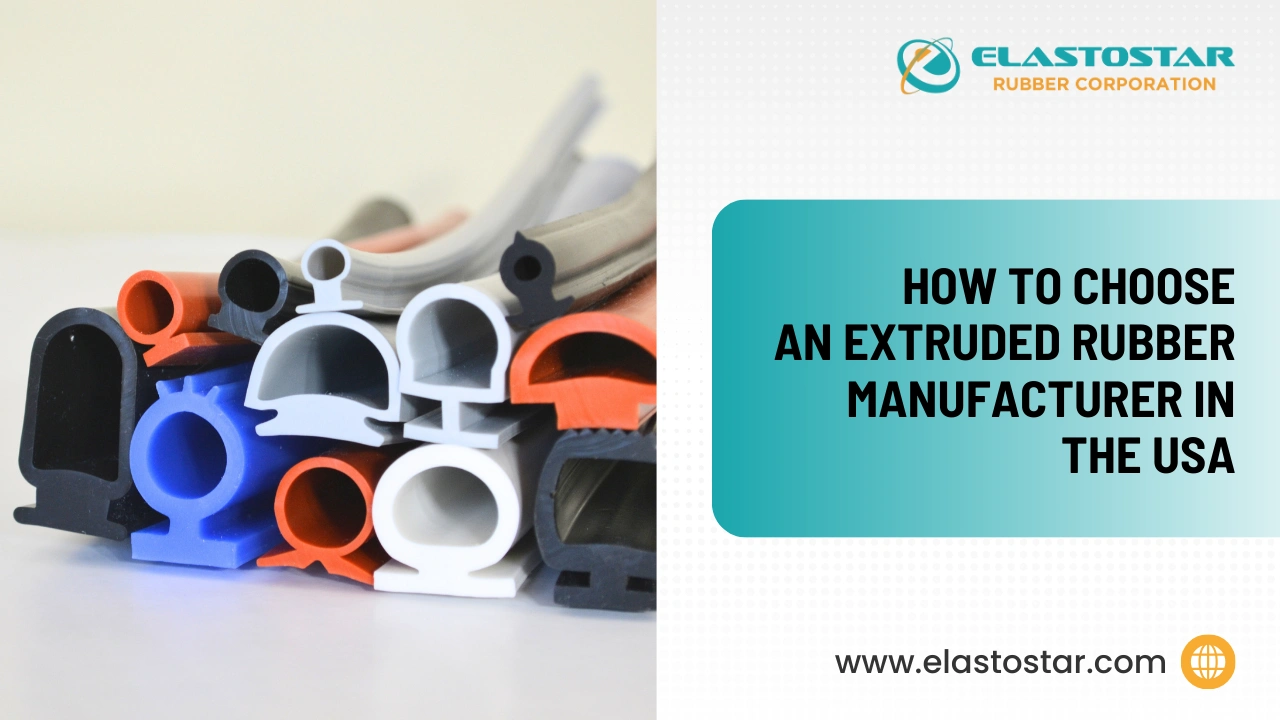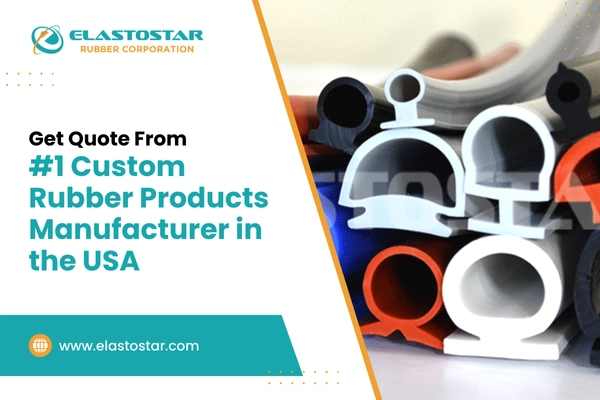Silicone rubber is a versatile material widely used in industries such as automotive, electronics, healthcare, and construction. Its ability to handle extreme temperatures, resist chemicals, and endure harsh environmental conditions makes it a reliable choice for many applications.
Understanding the resistance level of silicone rubber is essential for choosing the right material for specific needs. At Elastostar Rubber Corporation, we provide high-quality silicone rubber properties as a trusted custom rubber product manufacturer.
In this blog, we will explore its unique features and applications.
Table of Contents
What Is a Silicone Rubber?

Silicone is a type of synthetic rubber, known for its unique properties that set it apart from traditional rubbers. Its chemical structure, based on a siloxane backbone, gives it flexibility and durability under extreme conditions. When comparing silicone vs rubber, silicone offers superior temperature resistance, maintaining performance in both high and low extremes.
Additionally, silicone is more resistant to environmental factors such as UV rays, ozone, and chemicals, making it a preferred choice for demanding applications. While traditional rubber is often less expensive, silicone’s reliability and versatility make it ideal for specialized uses.
Material Properties of Silicone Rubber
Silicone rubber is renowned for its exceptional material properties of silicone rubber, which make it highly versatile across industries.
Its key characteristics include excellent flexibility, tensile strength, and resistance to extreme temperatures, chemicals, and environmental factors. This combination of properties ensures durability and reliability even in the most challenging conditions.
Different grades of silicone are customized to specific applications.
For example:
- General-purpose grades are used in automotive gaskets and seals.
- High-temperature grades are ideal for industrial applications exposed to heat.
- Medical-grade silicone is biocompatible and used for implants and tubing.
By selecting the appropriate grade, silicone rubber can meet the unique demands of both industrial and consumer products.
What is the Resistance Level of Silicone Rubber?
Silicone rubber offers exceptional resistance across various categories, making it a reliable material for numerous applications.
1. Temperature Resistance
Silicone rubber is renowned for its ability to perform across a broad silicone rubber temperature range of -100°C to 300°C. This makes it suitable for both high-temperature industrial applications and extremely cold environments. Its silicone rubber temperature rating ensures reliability where other materials might degrade.
Additionally, many ask, “Can silicone withstand heat?“ The answer is yes—silicone’s unique chemical structure, featuring a strong Si-O bond, allows it to maintain stability and resist deformation even in demanding high-temperature applications.
2. Chemical Resistance
One of silicone rubber’s standout features is its chemical resistance of silicone, which makes it ideal for handling oils, alcohols, and diluted acids. However, its resistance can vary with more aggressive substances like concentrated acids and alkalis.
If you’re wondering, “Is silicone oil resistant?”, the answer is yes—silicone rubber can resist oil exposure, making it perfect for automotive and industrial uses. Additionally, its silicone acid resistance ensures functionality in environments exposed to mild acidic substances.
3. UV Resistance
When exposed to sunlight and harsh outdoor conditions, silicone rubber exhibits excellent silicone UV resistance, maintaining its integrity over time.
A common question, “Is silicone UV resistant?“, is confidently answered by its proven durability. This makes it a preferred material for outdoor sealants, weatherproofing applications, and solar panel components.
4. Abrasion Resistance
In industrial environments, abrasion resistance rubber plays a vital role in ensuring long-term performance and durability. But what does abrasion resistance mean? It refers to a material’s ability to resist wear and tear caused by friction or mechanical stress. Silicone rubber’s excellent abrasion resistance ensures its suitability for seals, gaskets, and other high-friction applications.
5. Mechanical Properties
The silicone rubber mechanical properties make it a reliable choice for demanding applications. Its tensile strength, elasticity, and compression set properties allow it to maintain performance under stress. Additionally, its silicone rubber modulus of elasticity contributes to its flexibility and resilience, supporting applications in the automotive, electronics, and medical fields.
| Property | Details |
| Temperature Resistance | Functions between -100°C to 300°C, suitable for extreme heat and cold without deforming. |
| Chemical Resistance | Resists oils, alcohols, and diluted acids, but less effective against concentrated acids. |
| UV Resistance | Highly durable under sunlight and ozone exposure, ideal for outdoor use. |
| Abrasion Resistance | handles wear and tear in high-friction environments, ensuring long-lasting performance. |
| Mechanical Properties | Strong tensile strength and flexibility, maintaining performance under stress and pressure. |
Silicone rubber’s resistance to temperature, chemicals, UV, and abrasion, combined with its mechanical strength, makes it a versatile material for various industries. These properties ensure reliability in demanding conditions, whether indoors or outdoors.
What are the Applications of Silicone Rubber?

Silicone rubber’s versatility and resistance properties make it essential for various industries.
- Automotive
Silicone rubber is widely used in extruded rubber components like gaskets, seals, and hoses. These parts are essential for engines and systems exposed to extreme temperatures and chemicals. - Electronics
Electrically conductive silicone rubber tubing plays a critical role in high-voltage systems, offering excellent insulation and reliability in electronic devices. - Construction
The durability of UV-resistant silicone makes it ideal for outdoor sealants, weatherproofing materials, and components exposed to sunlight and harsh weather conditions.
These applications demonstrate silicone rubber’s adaptability to meet the unique demands of different industries while ensuring long-lasting performance.
Exceptional Heat Resistance of Silicone Rubber
Silicone rubber is highly valued for its heat resistance, making it suitable for industrial applications exposed to extreme temperatures. It can consistently perform in environments ranging from -100°C to 300°C without losing its properties.
The silicone burning point is significantly higher than that of most organic rubbers, ensuring safety and reliability in high-temperature conditions. Its unique chemical structure allows it to resist deformation and maintain stability even in extreme heat.
This exceptional heat resistance makes silicone rubber a preferred choice for applications in automotive engines, industrial machinery, and electronics.
Why Choose Elastostar Rubber Corporation?
Elastostar Rubber Corporation is a trusted custom rubber product manufacturer known for delivering high-quality solutions tailored to your needs. We specialize in producing silicone rubber gasket solutions and extruded rubber products for a wide range of industries.
Our focus is on creating products that meet specific industry requirements while ensuring durability, performance, and reliability. Whether you need precision-engineered gaskets or versatile extruded rubber components, we have the expertise and resources to provide the best solutions for your applications.
Choose us for innovative rubber manufacturing that you can depend on.
Recommended Reads
- The Advantages of Silicone for Rubber Products
- What Makes Heat-Resistant Silicone So Popular?
- Silicone Rubber Frequently Asked Questions

Conclusion
Silicone rubber offers exceptional properties, including its wide silicone rubber temperature range, strong chemical resistance of silicone, and excellent UV-resistant silicone. These attributes make it indispensable for various demanding applications, from industrial machinery to consumer products. Its durability and adaptability ensure reliable performance across industries. For high-quality silicone rubber solutions, Elastostar Rubber Corporation is your trusted partner.
FAQs
1. What is the resistance of silicone rubber?
Silicone rubber resists extreme temperatures, UV rays, and chemicals, functioning from -100°C to 300°C. It is ideal for tough environments like automotive and electronics. At Elastostar Rubber Corporation, we deliver silicone rubber solutions that maximize these resistance capabilities for reliable performance.
2. How heat resistant is silicone rubber?
Silicone rubber can withstand high temperatures up to 300°C without losing its properties. Its chemical structure ensures stability even in extreme heat.
3. What is the strength of silicone rubber?
Silicone rubber is highly durable, offering strong tensile strength and flexibility. It can handle mechanical stress and maintain performance under pressure.
4. What is the resistance of rubber?
Rubber varies in resistance, but silicone rubber is known for its ability to resist heat, chemicals, and UV exposure, making it more versatile than other types of rubber.
5. What is in silicone rubber?
Silicone rubber is made of silicon, oxygen, carbon, and hydrogen, giving it flexibility, durability, and resistance to heat, chemicals, and UV rays. Elastostar Rubber Corporation uses silicone rubber’s unique composition to create durable, high-performance products tailored to your needs.
6. What is the most resistant rubber?
Silicone rubber is considered one of the most resistant types of rubber due to its ability to handle extreme temperatures, chemicals, and environmental stress.




